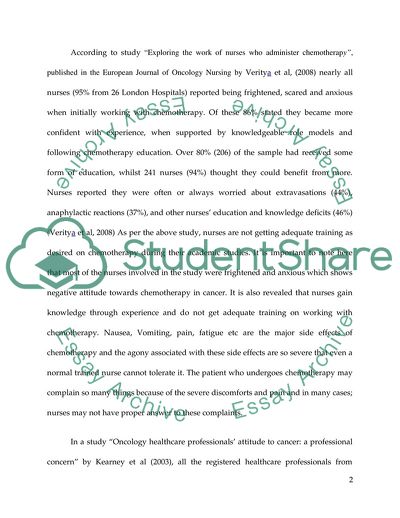Cite this document
(Nurses Attitudes and Knowledge Towards Controlling Chemotherapy Side E Literature review, n.d.)
Nurses Attitudes and Knowledge Towards Controlling Chemotherapy Side E Literature review. https://studentshare.org/health-sciences-medicine/1742059-systematic-review-of-1studies-examining-nurses-attitudes-towards-chemotherapy-and-cancer-2studies-examining-nurses-knowledge-towards-side-effects-management-among-cancer-patients
Nurses Attitudes and Knowledge Towards Controlling Chemotherapy Side E Literature review. https://studentshare.org/health-sciences-medicine/1742059-systematic-review-of-1studies-examining-nurses-attitudes-towards-chemotherapy-and-cancer-2studies-examining-nurses-knowledge-towards-side-effects-management-among-cancer-patients
(Nurses Attitudes and Knowledge Towards Controlling Chemotherapy Side E Literature Review)
Nurses Attitudes and Knowledge Towards Controlling Chemotherapy Side E Literature Review. https://studentshare.org/health-sciences-medicine/1742059-systematic-review-of-1studies-examining-nurses-attitudes-towards-chemotherapy-and-cancer-2studies-examining-nurses-knowledge-towards-side-effects-management-among-cancer-patients.
Nurses Attitudes and Knowledge Towards Controlling Chemotherapy Side E Literature Review. https://studentshare.org/health-sciences-medicine/1742059-systematic-review-of-1studies-examining-nurses-attitudes-towards-chemotherapy-and-cancer-2studies-examining-nurses-knowledge-towards-side-effects-management-among-cancer-patients.
“Nurses Attitudes and Knowledge Towards Controlling Chemotherapy Side E Literature Review”. https://studentshare.org/health-sciences-medicine/1742059-systematic-review-of-1studies-examining-nurses-attitudes-towards-chemotherapy-and-cancer-2studies-examining-nurses-knowledge-towards-side-effects-management-among-cancer-patients.


